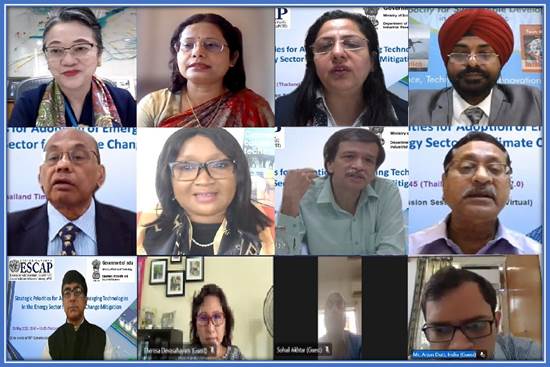Ministry of Science & Technology
Side Event of India held yesterday on Strategic Priorities for Adoption of Emerging Technologies in the Energy Sector for Climate Change Mitigation during the 78th Commission Session of UN-ESCAP
प्रविष्टि तिथि:
25 MAY 2022 6:57PM by PIB Delhi
Emerging technologies and their innovative applications in the energy sector offer advantages such as efficiency improvement, emissions reduction and cost optimization, among others. Enabling policies and strategies are essential to facilitate transfer and diffusion of emerging technologies across the Asia-Pacific region. To discuss and identify strategic priorities for adoption of emerging technologies in the energy sector, a virtual side event was organized on 24 May 2022 during the 78th Session of ESCAP, from 23-27 May 2022. The event was jointly organized by the Department of Scientific and Industrial Research (DSIR), Ministry of Science and Technology, Government of India and the Asian and Pacific Centre for Transfer of Technology (APCTT) of ESCAP.
Welcoming the delegates, Mr. Surinder Pal Singh, Joint Secretary of DSIR & National Focal Point (India) for APCTT underlined the critical importance of emerging technologies such as AI, IoT, Blockchain and Big Data for the energy and power sector and called for more engagement to work for solutions and adoption of these technologies among member states.

The Head of APCTT, Dr. Preeti Soni, highlighted the need to identify regional priorities and explore strategies for cross-border transfer and diffusion of emerging technologies among member States in the energy sector. Ms. Alpana Dubey, Deputy Chief of Mission, Embassy of India, Bangkok and Deputy Permanent Representative to UNESCAP, appreciated the efforts of DSIR in jointly organizing this important side event and expressed her hope that this event would result in collective action at all levels in tackling climate change issues, through adoption of emerging technologies, in the energy sector. Ms. Armida Salsiah Alisjahbana, Under-Secretary-General and Executive Secretary of ESCAP, in her special remarks, highlighted the need to arrive at suitable strategies for international cooperation across the Asia-Pacific region.
The thematic session on ‘Regional priorities and challenges’ was moderated by Dr. Soni. The eminent panelists comprised (1) Dr. Ajay Mathur, Director General, International Solar Alliance, (2) Dr. Rose Mwebaza, Director and Advisory Board Secretary, Climate Technology Centre & Network, (3) Prof. Rangan Banerjee, Director, Indian Institute of Technology (IIT) Delhi, and (4) Prof. Pinakeswar Mahanta, Director, National Institute of Technology (NIT) Arunachal Pradesh, India. The panelists presented their experiences and recommendations regarding the regional priorities and challenges in the energy sector for climate change mitigation, based on current trends in the sector with examples of best practices from the Asia-Pacific region. The experts underscored the need for regional collaboration and conducive policy ecosystem to overcome the existing challenges and to accelerate the adoption of emerging technologies in the energy sector. The participants from member countries and institutions /organizations raised very inquisitive queries especially from Philippines and Pakistan among others. The representative of Philippines appreciated the need of renewable power sector and asked about the policies and measures taken by government of India in successful promotion of renewable energy and use of emerging technologies in the country which was replied by the Indian representatives in detail. The representative from Pakistan raised a pertinent question about the agreement between India and France on solar technology. Representative from United Kingdom was of the opinion that partnerships are crucial for community development and acknowledged ISA’ statement on women being enlisted to sell solar panels which proves an excellent example demonstrating the active participation of women and community in the transition towards clean energy. She requested the Indian speakers to share more examples reflecting the active participation of the community to mitigate climate change and also, the role of gender or green bonds and the involvement of other critical partners to benefit local communities.
There were other questions raised by member countries on the sustainable deployment of solar photovoltaics and how capacity building is required in this direction. Some valuable suggestions were also received from participants e.g. one participant stated that dissemination of information about renewable technologies, commercialization and its availability to all stakeholders is very important. Similarly, another suggestion was received that visibility of policies to young entrepreneurs and SMEs in all the participating countries are very important too and APCTT should take appropriate measures in this regard.
The event concluded with closing remarks by Dr. Ramanuj Banerjee, Scientist ‘F’, DSIR and & National Focal Point (India) for APCTT. He underpinned that future will require a clear vision and strong commitment of cooperation by the member States towards adoption of Emerging Energy Technologies for Climate Change Mitigation on this Earth. This side event was attended by over 100 participants from the Asia-Pacific region and provided a platform for experts, policy makers and participants from the member States to deliberate on strategies to facilitate transfer and adoption of emerging technologies in the energy sector for climate change mitigation.
<><><><><>
SNC/RR
(रिलीज़ आईडी: 1828294)
आगंतुक पटल : 1564